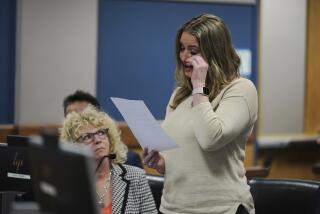Legal Experts Agree Defendant Is âMaking a Bad Case Worseâ
NEW YORK â When Ramzi Ahmed Yousef startled the court by announcing he was acting as his own lawyer at his trial for plotting to blow up a dozen U.S.-owned airliners over the Pacific, Judge Kevin T. Duffy responded viscerally and bluntly from the bench.
âWhat you might be doing is making a fool of yourself,â the U.S. district judge warned in federal court in Manhattan.
A jury found Yousef guilty in 1996.
A New York state court jury convicted Colin Ferguson, who killed six passengers aboard a crowded Long Island Railroad commuter train in December 1993. He also fired his lawyers.
So did suicide physician Jack Kevorkian and serial killer Ted Bundy. Bundy was executed in 1989. Kevorkian remains in prison.
Thus, when sniper suspect John Allen Muhammad persuaded Virginia Judge LeRoy F. Millette to let him handle his own defense in the slaying of Dean Harold Meyers, legal experts said he diminished his chances for acquittal.
Meyers was killed outside a gas station in northern Virginia last year.
âIf it is possible to make a bad case worse, this defendant is doing it,â said Peter Driscoll, a veteran criminal defense lawyer in New York who observed that as a novice cross examiner, Muhammad had already handicapped himself in developing facts during the trial. âPerhaps at the end of this case, if there is a guilty verdict, the jury will have some compassion for him and spare him the death penalty.â
James Cohen, associate professor and director of clinical education at Fordham Universityâs Law School, agreed.
âIt reminds me of the Long Islandâ case, Cohen said. âFerguson was completely crazy. He was psychotic during the trial, if not during the incident itself, and yet he was permitted to represent himself, which made a mockery of the justice system. He ended up in prison for life without the possibility of parole.â
Legal scholars said judges often will vigorously attempt to dissuade defendants from being their own counsel.
Frequently, those who do so anyway are accused felons who have been represented by lawyers in previous cases.
âThey get the idea it is a cinch to become a lawyer,â said H. Richard Uviller, professor of law emeritus at Columbia University Law School.
Such defendants often forget a basic fact of litigation.
âIn all cases, the lawyer becomes the personification of the client,â Uviller said. âThe more credible the lawyer is, that tends to rub off on the client to some degree.â
Generally, when defendants decide to represent themselves, judges will appoint lawyers to act as their advisors.
In the jetliner case, Duffy vigorously tried to dissuade Yousef from representing himself. When the U.S. District Court judge failed, he allowed Yousefâs former attorney to act in an advisory role.
At times, his former lawyer, Roy R. Kulcsar, coached Yousef and fed him questions to ask during cross examination. But the strategy didnât work.
Yousef is serving a life sentence in prison for the plot. In 1997, he was convicted of leading the February 1993 bombing of the World Trade Center that killed six people and injured more than 1,000.
Yousef allowed Kulcsar to represent him during the second trial. He was sentenced to 240 years in prison for the attack.
More to Read
Sign up for Essential California
The most important California stories and recommendations in your inbox every morning.
You may occasionally receive promotional content from the Los Angeles Times.










